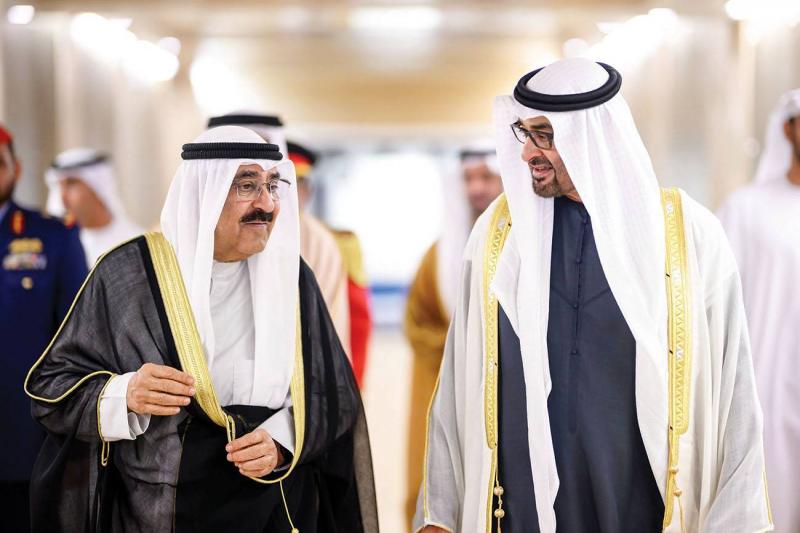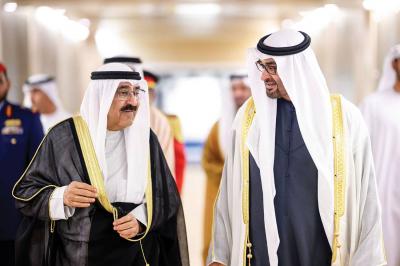The Amir of Kuwait, Sheikh Mishal Al-Ahmad, and the President of the United Arab Emirates, Mohammed bin Zayed Al-Nahyan, held an official meeting on Tuesday, where they discussed bilateral relations between their countries and ways to further develop them across various fields. The two sides praised the growth in trade and investments between the two nations, noting that the volume of non-oil goods trade reached 12.2 billion USD in 2023, a 2% increase compared to 2022. They emphasized the importance of expanding economic cooperation and partnership, utilizing available opportunities in both countries, and exploring economic prospects in line with Kuwait's Vision 2035 and the UAE’s Vision 2031.
Both parties welcomed investments and the expansion of business operations by Kuwaiti and Emirati companies, taking advantage of opportunities in vital sectors in preparation for hosting major events in the upcoming years. They expressed their anticipation for the upcoming ministerial meeting of the fifth session of the Joint Supreme Committee scheduled for this year, aimed at implementing the agreed-upon agreements and memorandums of understanding.
The Amir of Kuwait and the President of the UAE commended the close cooperation between the two nations in political, consular, diplomatic, economic, trade, financial, investment fields, as well as in the private sector, energy, cybersecurity, communications, technology, maritime transport and ports, among various other areas. This cooperation is based on the results of the subcommittees of the fifth session of the Joint Supreme Committee.
In the defense and security domain, both sides affirmed their commitment to enhancing defense cooperation and developing strategic partnerships to safeguard the security and stability of both countries and the region. They praised the existing level of security cooperation and coordination and expressed their desire to strengthen collaboration in combating all forms of crime, countering terrorism, and sharing expertise in border security.
The two parties stressed the need to combat extremism in all its forms, reject any rhetoric of racism and hatred, and emphasized the importance of promoting values of tolerance, dialogue, and human solidarity, along with fostering a culture of moderation, which in turn would achieve security, stability, and prosperity for the peoples of the region and the world. They also discussed regional developments and their implications for Arab-Arab relations and regional security and stability.
In the Kuwaiti-Emirati statement issued at the conclusion of the Amir of Kuwait's visit to the UAE, both sides emphasized the importance of Iraq respecting Kuwait's sovereignty and territorial integrity, adhering to bilateral and international commitments, and all relevant United Nations resolutions, particularly Security Council Resolution 833 (1993), which delineated the land and maritime borders between Kuwait and Iraq. They highlighted the necessity of completing the maritime border demarcation between the two countries beyond marine marker 162.
Both parties reaffirmed Iraq’s commitment to the Maritime Navigation Agreement in Khor Abdullah signed between Kuwait and Iraq on April 29, 2012, which came into effect on December 5, 2013, after being ratified by both countries. They jointly deposited it with the United Nations on December 18, 2013. Furthermore, they expressed their rejection of Iraq's unilateral cancellation of the security exchange protocol signed in 2008 and its adopted map in the joint plan to ensure safe navigation in Khor Abdullah, which was signed by both sides on December 28, 2014; both documents included specified mechanisms for amendment and cancellation.
The two sides reiterated their support for Security Council Resolution 2107 (2013), which calls on the UN Secretary-General's representative and head of the United Nations Assistance Mission for Iraq (UNAMI) to enhance, support, and facilitate efforts related to finding missing Kuwaitis and third-country nationals and determining their fate or returning their remains within the framework of the trilateral committee and the related sub-technical committee under the auspices of the International Committee of the Red Cross. They also emphasized the importance of returning Kuwaiti properties, including the national archives, and the need for the Security Council to continue monitoring the files concerning the missing Kuwaitis and third-country nationals and the lost Kuwaiti properties, including the national archives, through ongoing periodic reports submitted by the UN Secretary-General on the latest developments and the efforts of UNAMI in this regard.
Regarding the Durra field, both sides confirmed that the entire field lies within Kuwait's maritime areas, and that ownership of the natural resources in the submerged areas adjacent to the divided Kuwaiti-Saudi region, including the entire Durra field, is jointly owned by Kuwait and Saudi Arabia only, with exclusive rights to exploit the natural resources in that area under international law and based on the agreements in force between them. They firmly rejected any claims of rights by any other party regarding this field or the submerged area adjacent to the divided shared wealth region defined by Kuwait and Saudi Arabia.
Both parties underscored their consistent stance on the Iranian occupation of the three islands: Greater Tunb, Lesser Tunb, and Abu Musa, which belong to the UAE. They expressed support for the UAE's right to its three occupied islands and a firm rejection of Iran's continued occupation of the islands, emphasizing the UAE's full sovereignty over its three islands, territorial waters, airspace, continental shelf, and exclusive economic zone, as an integral part of the UAE's territory while retaining all its rights.
Regarding navigation in the Red Sea, both sides stressed the importance of maintaining security and stability in the Red Sea region and respecting the right to maritime navigation therein according to the provisions of international law and relevant UN agreements.
On the regional front, both sides discussed the situation in the Palestinian territories, expressing deep concern over the humanitarian catastrophe in the Gaza Strip, where a war has resulted in the deaths of tens of thousands of innocent civilians and the destruction of vital facilities, places of worship, and infrastructure, as well as the offices of international organizations due to Israeli attacks. They emphasized the necessity for the international community, particularly the Security Council, to fulfill its responsibilities to cease military operations in the Palestinian territories and protect civilians in accordance with international law and international humanitarian law.
Both parties affirmed their commitment to continuing humanitarian efforts aimed at providing relief assistance to mitigate the humanitarian suffering of the Palestinian people in the Gaza Strip and urged the international community to support humanitarian organizations and the efforts of the UN Relief and Works Agency for Palestine Refugees (UNRWA) to enable them to carry out their humanitarian mission.
They noted the need to intensify efforts to reach a comprehensive and just settlement of the Palestinian issue according to the principle of the two-state solution, which guarantees the Palestinian people their right to establish their independent state with East Jerusalem as its capital. Regarding regional crises, both parties reiterated their support for security and stability in the region, highlighting the importance of prioritizing dialogue and diplomatic solutions to resolve disputes and conflicts and opening communication channels to build bridges of partnership and cooperation, enhancing the values of solidarity, tolerance, peaceful coexistence, and sustainable growth, stability, and global peace for present and future generations in the region.




